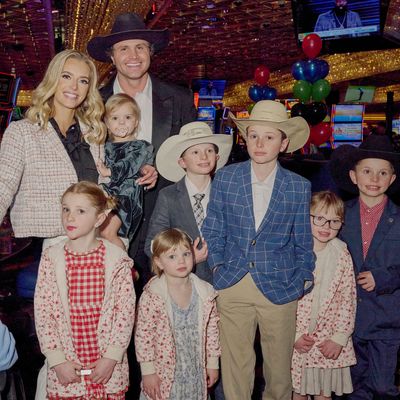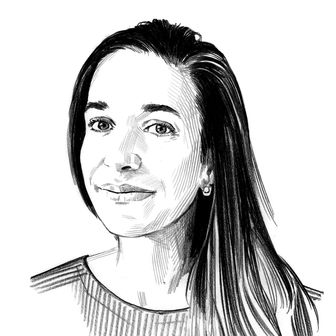
A common hazard with critiquing family influencers is that we side-eye them for showing only the cute stuff, and then we critique them as though what they show is all there really is. The latest cycle of virality for Ballerina Farm’s Hannah Neeleman has called into question a lot of what we’ve assumed, but this time, unlike her previous go-rounds in the media, the questions have come from both the press and from Neeleman herself.
I’ve been following Ballerina Farm for years, and I’ve always felt that I kind of knew Neeleman. I knew that shortly after graduating from Juilliard, she had left a ballet career behind to have eight kids in quick succession with her husband, Daniel, whose father owns JetBlue Airways. I knew they sold upscale flour and meat and Frenchified provisions from their huge Utah farm, and I knew she was a dedicated beauty-pageant competitor who competed for Mrs. American 2023 less than two weeks after having her eighth child. But I always thought there was something subtly knowing in her posts about life on the farm. Hannah seems temperamentally low-key, even when she’s in full pageant glam, and that has always made me hope that she’s self-aware about creating content that’s an elaborate charade about status, purity, and simplicity. She follows Alison Roman and Smitten Kitchen, I thought — how trad-pilled could she possibly be?! Then I read the now-viral profile in the Times. Oof.
In journalist Megan Agnew’s profile, which started out as a profile of Hannah only but was hijacked by Daniel, who monopolized a lot of Agnew’s time, and in a second, follow-up article that seems to have been published by popular demand, we get acquainted with the Neelemans’ politics: no elective abortion; no birth control. None of this should come as a surprise to anyone who knows about the Church of Latter-day Saints, to which the family is devout, but what’s more surprising is a story, told with seeming pride by Daniel, of how Hannah gave up her dream of pursuing a dance career to get married, months before she had initially said she was ready to, and proceed to have children nonstop for the next 13 years. There’s an anecdote, widely shared now, about how Hannah is sometimes so worn out from all the kids and work that she must take to her bed for a week. In the context of where women’s reproductive rights stand at this juncture, this detail is chilling.
The story unfolds like a nightmare to many readers — the kind of reality that we might all have to endure if we were suddenly transported to the 1950s, before Roe, before the Pill, and before mainstream feminism. It’s jarring to read an account of an overbearing husband behaving so unapologetically and being rewarded with everything he ever wanted. It’s a grim read, and it cranked up yet another round of virality for the couple, the last one having been just a few months ago when the New York Times published a profile of Hannah’s postpartum pageant run.
But this time it has a plot twist: A week following the profile’s publication, Neeleman responded with two simultaneous Instagram posts. The first is a defiant Reel in which she appears working out in her vast home gym alongside her husband, calling them co–diaper changers and co-CEOs. (The gym scene was surely meant as a subtle correction of the record: In the profile, it’s reported that a barn that Neeleman had hoped to use as her ballet practice space had been appropriated for the kids’ homeschooling. In the Reel, a barre is visible in the background.) She criticizes Agnew’s profile for having been the product of a predetermined agenda and not an accurate representation of what their life is like. The second post directs us to an update to the “About Us” page on the Ballerina Farm webpage, narrated by Hannah, providing a detailed story of the couple’s life together — their side of the story. Hannah makes a point to note that, rather than cut her Juilliard education short, Daniel sidelined his “athletic career” as a lacrosse player at BYU and moved in with her in New York while she finished up her last year of school. She traces their discovery of a shared love of farming to their time living together in Brazil. It’s a cute story, and it presents a counternarrative that complicates the idea that she’s submissive to her husband.
These posts are a big departure for Neeleman: It’s the first time I have ever seen her directly engage with her detractors, which, it should be noted, are legion and vocal. After all, there’s an entire symbiotic media ecosystem dedicated to the analysis of Ballerina Farm and other tradwife accounts — my fellow Cut columnist Amil Niazi calls it the Ballerina Farm-industrial complex. But after watching Hannah’s unprecedented breaking of the fourth wall, it’s hard not to wonder if maybe the Neelemans live in a totally different world than most of us in their audience, and that it would take more than an afternoon spent riding around their farm to understand what they’re really about. I’ve certainly never felt less sure.
The aesthetics of Ballerina Farm — upscale yet homespun and homemade — are a lot of the reason she has over 9 million followers. But the aesthetics are not just pretty; pretty is boring on its own. What makes Ballerina Farm’s aesthetics sticky is that they’re a little bit destabilizing. The Times article calls Hannah the queen of the tradwives, but I’ve never thought that label fit her, and she rejects it, too. She very subtly code switches in her dress (I’ve seen her in Rudy Jude, a brand that is decidedly liberal-coded), her speech (her low, serious tone of voice does not conjure wifely submission, at least to my ear), and even in her no-nonsense relationship to the camera. I wonder if she learned that code-switching at Juilliard, or maybe during the four years when she lived in Brazil, but wherever she picked it up, it has served her incredibly well, allowing people like me, who would never otherwise be especially interested in the goings-on in a conservative LDS household, to eagerly follow along.
The reason many middle-aged moms with left-leaning views like me are so bedeviled by Ballerina Farm is that it’s confusing that content so visually appealing can also represent such a threat to our sense of equality. She makes motherhood look easy; we all know it’s not. She considers herself no less liberated than any of her critics; those of us who value our reproductive rights disagree. But ultimately the conundrum is that we enjoy watching her content while being totally unable, and often just as unwilling, to imagine what it would be like to be her.
Neeleman’s clap-back Reel will inevitably be picked apart for authenticity of tone, for evidence that betrays her submission to her husband; this would be missing the point. Agnew’s profile of the Neelemans reminded me that there’s always a lot more going on than what’s made into content. All the Reels in the world wouldn’t be able to contain everything that happens within a family. That’s part of what makes momfluencers so maddening and fascinating to begin with: They seek to contain the concept of “home,” which we all know from vivid universal experience is absolutely uncontainable. Home is never one way. No topic is less suited to representation on social media.
I found Agnew’s profile thoughtful, but with the impossible task of capturing an entire family culture, she could only do so much. If she were profiling a celebrity of the usual kind — an athlete, perhaps, or an actor — we would accept that we were only getting access to a sliver of real life. But as soon as people put their families on social media, we presume that we’re seeing the whole picture.
But Ballerina Farm, like any influencer, is brand storytelling, not cinéma-vérité. The story of real life, as any social scientist or investigative journalist knows, very rarely adheres to one extreme. It’s usually an untidy mixture of contradictions, a mixture that is hard to describe and impossible to represent on social media. Is Hannah Neeleman under her husband’s thumb, or is she a co-CEO? As the saying goes, both things can be true. In her profile, Agnew asked about nannies and learned that there aren’t any, but I have no doubt that the Neeleman’s do in fact have child care, even if they don’t label it as such. They admit to having help with homeschooling the kids, and if you’ve ever spent time among LDS families in Utah, you know there are an abundance of young people who take care of children in all kinds of capacities, formal and informal. Maybe they don’t call themselves nannies, but they’re around, and I noticed that Hannah included one such cheerful blonde-haired helper, whom she has featured before, shortly after the story went viral.
Does Hannah owe anyone an answer or an explanation? I’m not sure she does. Moms like me use her image as a proxy in a culture war in which she never enlisted and seems to have no interest. You might say that she has no choice, that her content is political by virtue of being public, but I would counter that this makes it all the more important for those of us who want to situate it politically to question our assumptions.
Unless she endorses the Trump-Vance ticket in a Reel, ham-handedly stage-managed by Daniel, Hannah Neeleman is just a highly visible working mom. She has a too-demanding husband and a lot of kids — relatable to many, unfortunately. Whatever she really thinks about while she’s practicing ballet at dawn in her gym, we’ll never know. In the midst of polarization and endless cycles of reactionary take-baiting, and despite whatever she writes on her website’s About Us section, Hannah Neeleman is a cipher. This is what keeps us coming back for more.





